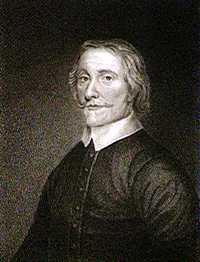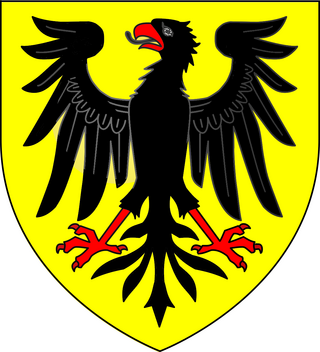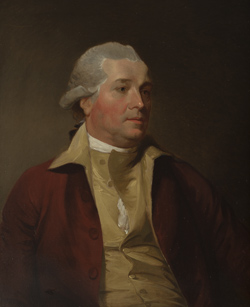
Baron Lyttelton is a title that has been created once in Peerage of England and twice in Peerage of Great Britain, both times for members of the Lyttelton family. Since 1889 the title has been a subsidiary title of the viscountcy of Cobham.

Viscount Cobham is a title in the Peerage of Great Britain that was created in 1718. Owing to its special remainder, the title has passed through several families. Since 1889, it has been held by members of the Lyttelton family.

Earl Temple of Stowe, in the County of Buckingham, is a title in the Peerage of the United Kingdom. It was created in 1822 for Richard Temple-Nugent-Brydges-Chandos-Grenville, 2nd Marquess of Buckingham, who was created Marquess of Chandos and Duke of Buckingham and Chandos at the same time. In contrast to the Marquessate and Dukedom, which were created with remainder to the heirs male of his body only, the Earldom was created with remainder to (1) the heirs male of his body, failing which to (2) the heirs male of his deceased great-grandmother the 1st Countess Temple, failing which to (3) his granddaughter Lady Anna Grenville and the heirs male of her body, and then to possible younger daughters of Lord Temple and the heirs male of their bodies.

Viscount Valentia is a title in the Peerage of Ireland. It has been created twice. The first creation came in 1621 for Henry Power. A year later, his kinsman Sir Francis Annesley, 1st Baronet, was given a "reversionary grant" of the viscountcy, which stated that on Power's death Annesley would be created Viscount Valentia. Annesley, a member of an influential Anglo-Irish family which descended from Newport Pagnell in the County of Buckinghamshire, was a favourite of James I, who granted him land in Ireland, notably the fort of Mountnorris in County Armagh. He was knighted in 1616, created a baronet, of Newport Pagnell in the County of Buckingham, in the Baronetage of Ireland in 1620 and Baron Mountnorris, of Mountnorris in the County of Armagh, in 1628.

Viscount Hardinge, of Lahore and of Kings Newton in the County of Derby, is a title in the Peerage of the United Kingdom. It was created in 1846 for the soldier and Tory politician Sir Henry Hardinge. His son, the second Viscount, represented Downpatrick in Parliament. His great-great-grandson, the sixth Viscount, succeeded a distant relative as eighth Baronet, of Belle Isle in the County of Fermanagh, in 1986. This title had been created in the Baronetage of the United Kingdom 1801 for Richard Hardinge. He was the third son of Nicolas Hardinge, younger brother of Reverend Henry Hardinge and uncle of the latter's third son Henry Hardinge, 1st Viscount Hardinge. The baronetcy was created with special remainder to the heirs male of Richard Hardinge's father.

Viscount St Davids, of Lydstep Haven in the County of Pembroke, is a title in the Peerage of the United Kingdom. It was created in 1918 for John Philipps, 1st Baron St Davids. The Philipps family descends from Sir John Philipps, who represented Pembrokeshire in the House of Commons. In 1621 he was created a Baronet, of Picton Castle in the County of Pembroke, in the Baronetage of England. His grandson, the third Baronet, also sat as Member of Parliament for Pembrokeshire. He was succeeded by his son, the fourth Baronet. He represented Pembroke and Haverfordwest in Parliament. His son, the fifth Baronet, sat for Haverfordwest. He was succeeded by his younger brother, the sixth Baronet. He represented Carmarthen, Petersfield and Pembrokeshire in the House of Commons.

Baron Monson, of Burton in the County of Lincoln, is a title in the Peerage of Great Britain. It was created in 18th century for Sir John Monson, 5th Baronet. The Monson family descends from Thomas Monson, of Carleton, Lincolnshire. He sat as Member of Parliament for Lincolnshire, Castle Rising and Cricklade. On 29 June 1611 he was created a Baronet, of Carleton in the County of Lincoln, in the Baronetage of England. His eldest son, the second Baronet, fought as a Royalist during the Civil War and also represented Lincoln in the House of Commons.
The Baronetcy of Temple, of Stowe, in the Baronetage of England, was created on the 24th of September 1611 for Thomas Temple, eldest son of John Temple of Stowe, Buckinghamshire. His great-grandson Sir Richard, 4th Baronet, was created Baron Cobham on 19 October 1714, and Viscount Cobham and Baron Cobham on 23 May 1718, the latter with a special remainder, failing his male issue to his sisters and their heirs male. Upon his death on the 13th September 1749, the barony of 1714 became extinct. Both the viscountcy and barony of 1718 passed to his elder sister, and the baronetcy passed to his second cousin once removed William Temple, of Nash House, who became 5th Baronet. On the death of Sir William's nephew Sir Richard Temple, 7th Baronet, on 15 November 1786, the baronetcy became dormant.

There have been three baronetcies created for persons with the surname Booth, one in the Baronetage of England and two in the Baronetage of the United Kingdom. The 1916 creation remains extant, the 1835 creation became extinct in 1896 and the 1611 baronetcy has been dormant since 1797. The senior line of the first creation was elevated to the peerage as Baron Delamer and Earl of Warrington.

Sir Walter St John, 3rd Baronet, of Lydiard Tregoze, Wiltshire, and of Battersea, was an English Member of Parliament.

The Shakespeare Baronetcy, of Lakenham in the City of Norwich, is a title in the Baronetage of the United Kingdom. It was created in 1942 for the Liberal politician Geoffrey Shakespeare. The third and current Baronet is a geneticist and sociologist.
There have been three baronetcies created for members of the Gore family, all in the Baronetage of Ireland. All three titles are extant. The family also holds two earldoms and a barony.
There have been three baronetcies created for persons with the surname Bellingham, one in the Baronetage of England, one in the Baronetage of Ireland and one in the Baronetage of Great Britain. As of 2014 one creation is extant.
There have been two baronetcies created for members of the Wolseley family, one in the Baronetage of England and one in the Baronetage of Ireland. As of 2018, the Wolseley Baronetcy of Mount Wolseley is dormant.
Sir Thomas Lyttelton, 4th Baronet, of Frankley, in the County of Worcester, was an English landowner and Whig politician who sat in the House of Commons from 1721 to 1741. He held office as one of the Lords of the Admiralty from 1727 to 1741.

Sir Richard Temple, 3rd Baronet, KB was an English politician who sat in the House of Commons at various times between 1654 and 1697.

John Temple was the first British consul-general to the United States and the first British diplomat to have been born in what later became the United States. He was sometimes known as Sir John Temple, 8th Baronet.

The Lyttelton family is a British aristocratic family. Over time, several members of the Lyttelton family were made knights, baronets and peers. Hereditary titles held by the Lyttelton family include the viscountcies of Cobham and Chandos, as well as the Lyttelton barony and Lyttelton baronetcy. Several other members of the family have also risen to prominence, particularly in the field of cricket.
The Bundfamily of Wick Episcopi owned estates in Worcestershire since the fifteenth century; from this armigerous landed gentry family came several individuals of note in the fields of law, local government and literature.

Earl of Arran is a title in the Peerage of Ireland. It is not to be confused with the title Earl of Arran in the Peerage of Scotland. The two titles refer to different places: the Aran Islands in Ireland, and the Isle of Arran in Scotland. The Irish earldom is held by the Gore family. The Scottish earldom is a separate title, held as a subsidiary title of the Duke of Hamilton.















